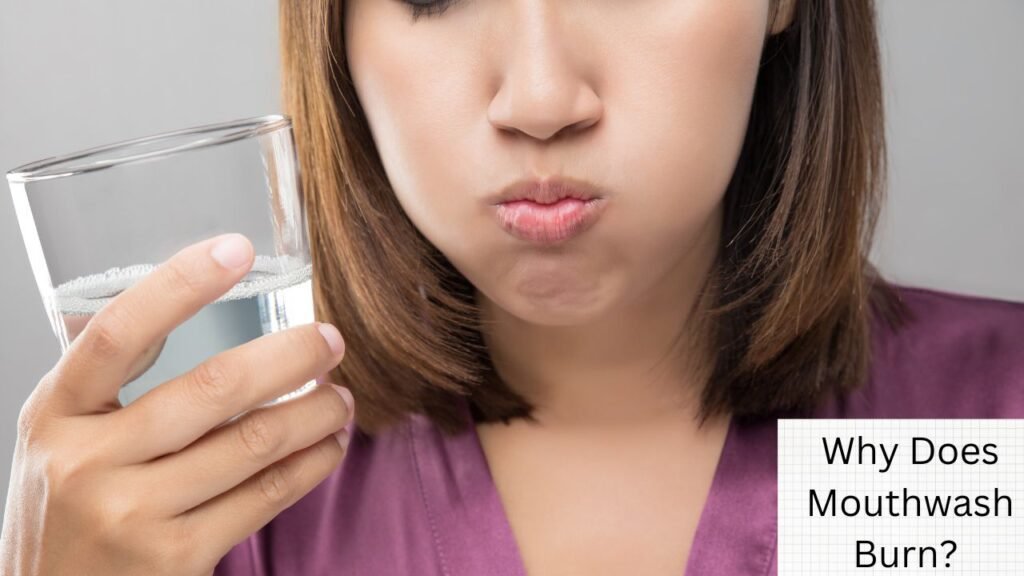If you’ve ever experienced a burning sensation after using mouthwash, you’re not alone. This discomfort can be puzzling and even off-putting. To help you understand why mouthwash causes this burning sensation and how to address it, we’ve broken down the issue into clear, actionable insights.
What Causes the Burning Sensation in Mouthwash?

Active Ingredients in Mouthwash
Mouthwash can contain a variety of active ingredients, each with different effects on your mouth:
- Alcohol: Many mouthwashes, especially antiseptic types, contain alcohol. It acts as a disinfectant but can also dry out and irritate the oral tissues. High-alcohol brands like Listerine can cause significant burning, particularly if you have sensitive gums or sores.
- Menthol: This ingredient provides a cooling effect but can also intensify the burning sensation. It’s commonly found in mouthwashes aimed at freshening breath.
- Eucalyptol and Thymol: These essential oils are effective at killing bacteria but can be harsh on sensitive mouths. They contribute to the overall potency of the swallowing mouthwash.
pH Levels and Sensitivity
The pH level of mouthwash can greatly influence its irritation potential:
- Acidic Mouthwashes: Mouthwashes with a low pH (acidic) can aggravate sensitive tissues and contribute to a burning sensation.
- Alkaline Mouthwashes: Highly alkaline mouthwashes can also disrupt the mouth’s natural pH balance, leading to discomfort.
Individual sensitivity varies, so a mouthwash that burns one person’s mouth might not affect another’s. Conditions like canker sores or gum disease can increase sensitivity to mouthwash.
How to Soothe the Burning Sensation
If you experience discomfort from mouthwash, here are some effective methods to alleviate it:
Rinse with Water
Immediately after using mouthwash, rinse your mouth with water. This dilutes the mouthwash and helps reduce its intensity, offering quick relief from the burning sensation.
Opt for a Gentle Mouthwash
Switching to a milder, alcohol-free mouthwash can make a significant difference. Products designed for sensitive mouths, like Biotene or Tom’s of Maine, are formulated to minimize irritation.
Use Over-the-Counter Remedies
For persistent burning, consider using over-the-counter remedies:
- Aloe Vera Gel: Known for its soothing properties, applying aloe vera gel to the affected area can reduce inflammation and provide relief.
- Lidocaine-Based Oral Gels: These gels numb the affected area and offer temporary relief from pain and burning.
Try Home Remedies
Natural solutions can also help soothe a burning mouth:
- Honey: Its anti-inflammatory properties can soothe irritation. Apply a small amount to the affected area for relief.
- Baking Soda Rinse: Mix one teaspoon of baking soda in a glass of water and use it as a rinse. This helps neutralize acidity and can reduce burning.
Preventing Mouthwash Burn
To avoid discomfort in the future, consider these tips:
Choose the Right Mouthwash
Select a mouthwash that aligns with your oral health needs. For sensitive mouths, opt for alcohol-free or specially formulated products. Avoid mouthwashes with high alcohol content or strong essential oils.
Follow Proper Usage Instructions
Adhere to the recommended amount and swish time as stated on the mouthwash label. Typically, using 20 milliliters for 30 seconds to one minute is sufficient. Overuse or extended swishing can increase irritation.
Maintain a Good Oral Hygiene Routine
Brushing and flossing before using mouthwash helps remove food particles and plaque, reducing the need for potent mouthwash ingredients that can irritate sensitive tissues.
When to Consult a Dentist
If you experience persistent burning despite following these tips, or if you notice other concerning symptoms, it’s time to seek professional advice:
Persistent Burning
Consult your dentist if the burning sensation continues despite using gentle mouthwashes and remedies. This could indicate an underlying issue that requires professional treatment.
Additional Oral Symptoms
If you experience symptoms such as swelling, sores, or bleeding gums, it’s crucial to visit your dentist. These could be signs of more serious oral health problems.
Comparative Analysis of Mouthwash Brands
To help you choose the right mouthwash, here’s a comparison of some popular brands:
| Brand | Alcohol Content | Key Ingredients | User Reviews |
|---|---|---|---|
| Listerine | High | Alcohol, Menthol, Thymol | Effective but may burn |
| Biotene | None | Glycerin, Sorbitol | Gentle, ideal for dry mouths |
| Crest Pro-Health | None | Cetylpyridinium Chloride | Mild, suitable for sensitive gums |
| Tom’s of Maine | None | Aloe Vera, Xylitol | Natural, soothing |
Conclusion
Experiencing a burning sensation from mouthwash can be uncomfortable, but understanding the causes and solutions can help you manage and prevent it. By choosing the right mouthwash, using it correctly, and incorporating soothing remedies, you can enjoy a fresh, clean mouth without the pain.
If problems persist, don’t hesitate to consult your dentist for tailored advice. Explore different mouthwashes and find one that suits your needs for a more pleasant oral care routine.
For more tips and advice on maintaining a healthy smile, check out our other blog posts and stay updated on the latest in oral health care.
Find Your Perfect Dentist
Easily book appointments with top-rated dentists in your area
Need Emergency Dental Care?
Get immediate help from verified dental professionals